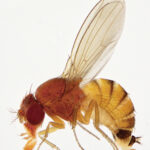Spotted Wing Drosophila: First Hudson Valley Trap Capture

Management of the insect to reduce egg laying in early raspberry should begin at first capture of adult or first sign of eggs deposited into fruit. Management tools to control SWD in raspberry
Insecticides with greatest efficacy against SWD in raspberry include:
Spinosad based insecticides Entrust and Delegate
Pyrethroid insecticides Brigade, Danitol, Mustang Max, Triple Crown
Organophosphate insecticides Malathion
Insecticides with greatest efficacy against SWD in blueberry include:
Spinosad based insecticides Entrust and Delegate
Pyrethroid insecticides Brigade, Danitol, Mustang Max, Triple Crown
Organophosphate insecticides Imidan, Malathion
Carbamate insecticide Lannate
The neonicotinoid insecticide Assail has low efficacy that may be improved by adding food grade sugar at 2 pounds per 100 gallons of water in the spray solution to the crop. Actara and Provado have not been found to be effective against SWD when used alone.
Hot and sunny days as well as rainfall reduce the residual efficacy of some insecticides. Temperatures above 80F reduce the residual efficacy of the pyrethroids group of insecticides, however, organophosphates are not effected by high temperatures and remain effective.
 Harvesting fruit and immediately storing at 38F will reduce the viability of SWD in the fruit. We observed high levels of mortality of deposited eggs and larva in blueberry that were stored for 48-72 hours in 34F and 38F. Encouraging PYO customers to cold store and enjoy fresh fruit shortly after harvest should be a part of your PYO marketing to the public. (UTC: Untreated Control of berries at various temperature with no oil treatments)
Harvesting fruit and immediately storing at 38F will reduce the viability of SWD in the fruit. We observed high levels of mortality of deposited eggs and larva in blueberry that were stored for 48-72 hours in 34F and 38F. Encouraging PYO customers to cold store and enjoy fresh fruit shortly after harvest should be a part of your PYO marketing to the public. (UTC: Untreated Control of berries at various temperature with no oil treatments)
